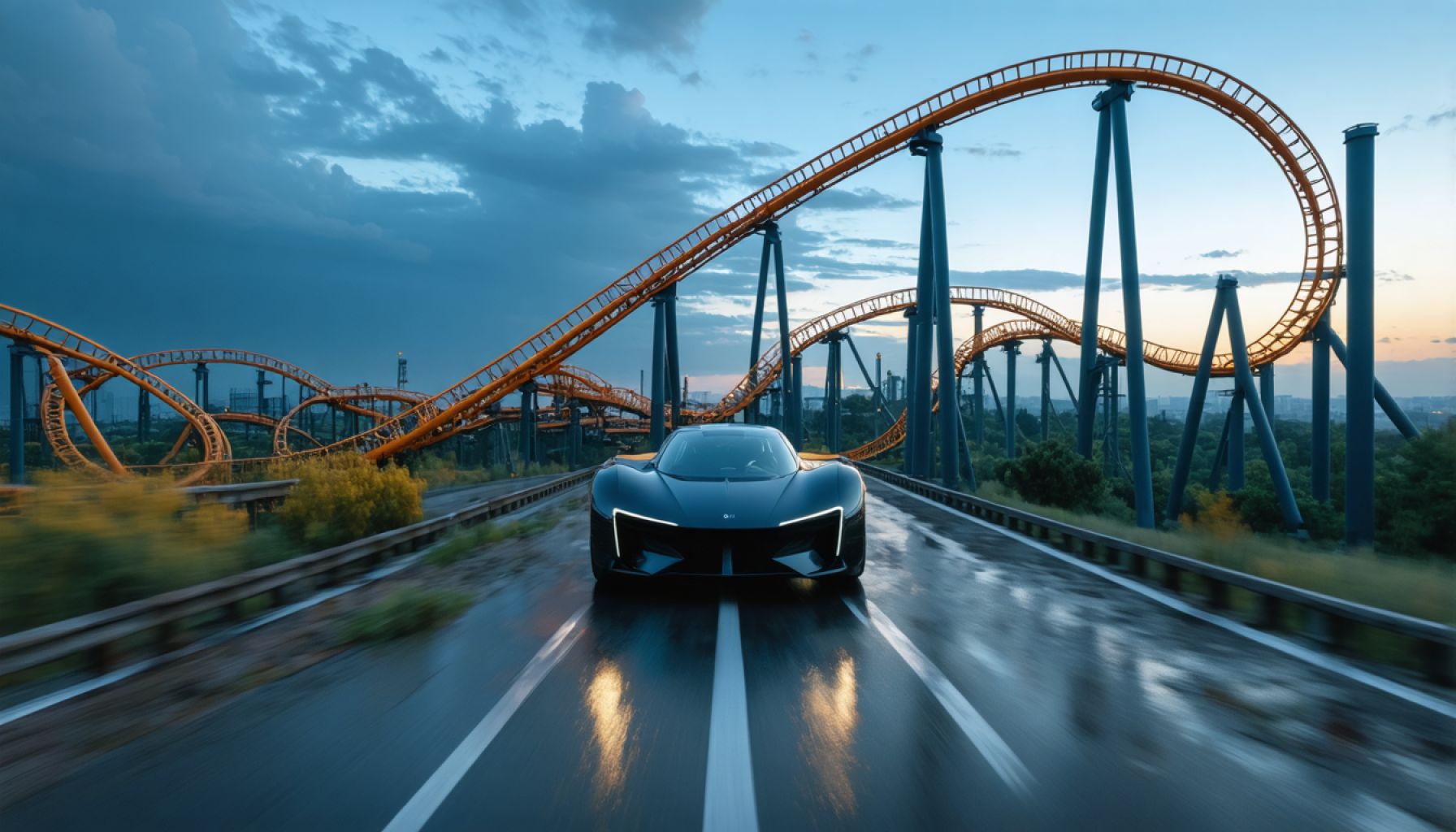- Uber has evolved from a startup to a major force in transportation, valued at $155 billion.
- The company’s stock soared by 193% over five years, though it currently trades 20% below its peak.
- Uber revolutionized urban transit, expanding to 10,000 cities and increasing revenue by 212% over five years.
- Initiatives like the Uber One subscription and UberX Share enhance customer engagement and affordability.
- Uber is heavily investing in autonomous vehicle technology, competing with industry leaders like Waymo and Nvidia.
- Until AV technology becomes mainstream, Uber’s success relies on its extensive traditional fleet operations.
- Pershing Square Capital Management supports Uber, predicting a 30% boost in earnings and sustained dominance.
- Uber represents essential urban mobility, poised to excel as autonomous technologies evolve.
Once a scrappy disruptor, Uber has matured into a titan of modern transportation, transforming the way we navigate our cities. Its journey from startup to a colossal enterprise valued at $155 billion is a gripping tale of ambitious vision, relentless innovation, and strategic maneuvers.
The ridges and valleys of Uber’s stock chart tell a story of dramatic swings—risks and rewards that could jolt even the most seasoned investor. With a breathtaking 193% surge over the past five years, the ride has been nothing short of exhilarating. But the present offers a new twist, as Uber’s cresting stock skims about 20% below its zenith, hinting at yet another potential ascent.
Uber’s Growth Trajectory
In just 16 years, Uber reshaped public transportation with a technology-first mindset. By championing convenience, reliability, and expansion across 10,000 cities, it made hailing a ride as intuitive as a tap on your smartphone. Gross bookings catapulted a staggering 150% in five years, propelling revenue skyward by 212%.
A key jewel in Uber’s crown is its burgeoning Uber One subscription service, which saw a 60% boost in membership in just one quarter. Uber also tempts more budget-conscious riders with innovations like UberX Share, weaving affordability seamlessly into its service fabric.
The Autonomous Quandary
Pioneering autonomous vehicle (AV) technology sits at the frontier of Uber’s future. Picture a metropolis pulsating with driverless cars, whizzing passengers to their destinations at fractional costs. It’s a realm where Uber has thrust itself alongside giants like Waymo and Nvidia, navigating partnerships to cement its place in the impending AV revolution.
Despite Tesla’s aspirations to steer its own robotaxi fleet onto the streets, Uber’s prowess lies cemented in its conventional fleet operations—dynamic pricing, precision in supply-demand matching, and extensive fleet mastery, which collectively fortify its lead. Until AV tech hits its stride, Uber’s human-centric rides maintain their stronghold.
Backing Uber’s robust setup is Pershing Square Capital Management, now a key investor. Despite inevitable uncertainties, the hedge fund foresees a lucrative path to a 30% earnings enhancement and believes Uber’s dominance paves the way for sustained triumphs.
The Bottom Line
Uber stands not just as a ride-hailing service, but as an emblem of indispensable urban mobility amid burgeoning technological shifts. While its past may prompt feelings of FOMO for some, its potential to thrive in the autonomous era remains a tantalizing prospect. For those with vision keen enough to glance at the horizon, Uber offers more than just a ride—it offers a journey into tomorrow’s transportation landscape.
Why Uber’s Journey Is Far from Over: Future Prospects & Market Insights
Exploring Uber’s Continued Evolution
Uber’s transformation from a daring startup to a powerhouse valued at around $155 billion is remarkable. As the company matured, it not only redefined urban transportation but also expanded its services into new territories. Here’s a closer look at how Uber’s trajectory is poised to influence the future of urban mobility.
How Uber Defies Market Fluctuations
Uber’s stock has seen significant volatility, including a 193% increase over the past five years. While currently trading about 20% below its peak, savvy investors recognize these fluctuations as opportunities:
– Market Resilience: Despite downturns, Uber’s strategies hint at potential stock rebounds.
– Investment Insights: Ongoing expansion and technological investments make Uber an appealing long-term option for investors looking for growth in the transportation sector.
Innovations Elevating Uber’s Services
1. Uber One Subscription: With a recent 60% increase in membership in a single quarter, Uber One underpins a new recurring revenue stream, enhancing user loyalty through exclusive benefits and discounts.
2. Budget Alternatives: Services such as UberX Share help captivate cost-conscious customers, potentially increasing market share by offering more affordable ride options.
Autonomous Vehicles: The Frontier of Uber’s Growth
Though full AV integration is not immediate, Uber’s investment in this sector showcases its commitment to future innovation:
– Partnerships: Collaborations with companies like Nvidia bolster Uber’s technological capabilities, preparing it for the fast-approaching era of driverless technology.
– Strategic Prowess: Unlike Tesla’s single-handed push for AV dominance, Uber’s focus on alliances leverages collective expertise, a combination projected to pay dividends once AVs become mainstream.
Understanding Uber’s Market Position
– Competitive Edge: Uber’s dominance in dynamic pricing, supply-demand algorithms, and global reach give it a competitive advantage even as new players emerge.
– Pershing Square Support: Backing from major investors like Pershing Square Capital Management underscores confidence in Uber’s earnings potential, with an estimated 30% growth.
Practical Insights and Recommendations
– Rider Tip: Frequent Uber users should consider the Uber One subscription for cost savings and added perks.
– Investment Advice: Evaluate Uber’s long-term market potential, particularly its investments in technology, when considering portfolio diversification.
– Sustainability Consideration: Keep an eye on Uber’s initiatives for green transportation, which can significantly influence environmental impact and regulatory compliance.
The Future of Uber: Consumer and Investor Implications
Uber is more than a ride-hailing giant; it is a pioneer in how technology shapes urban mobility. As the company continues to advance in AV and expand its service offerings, consumers and investors alike have reasons to watch Uber’s evolution closely.
For more information about Uber’s services and latest updates, visit the official Uber website.







